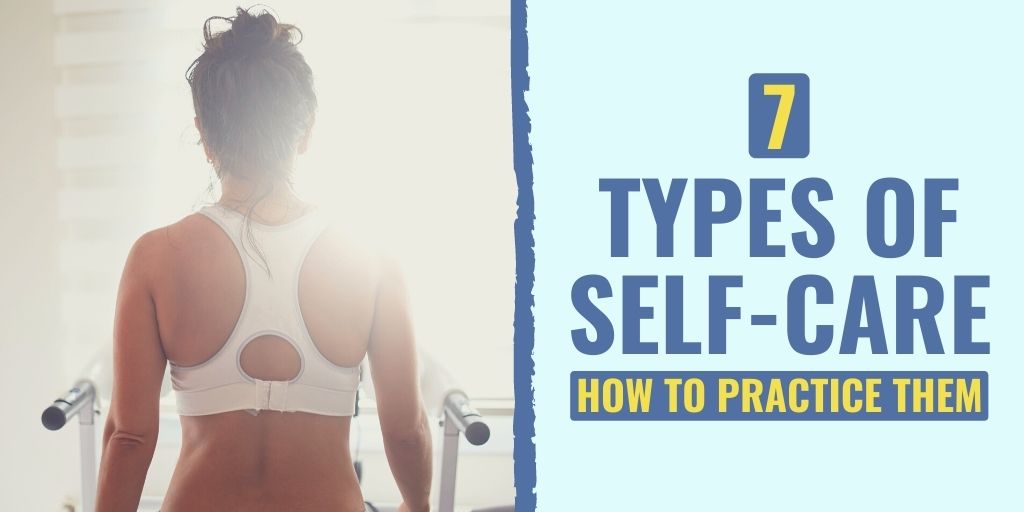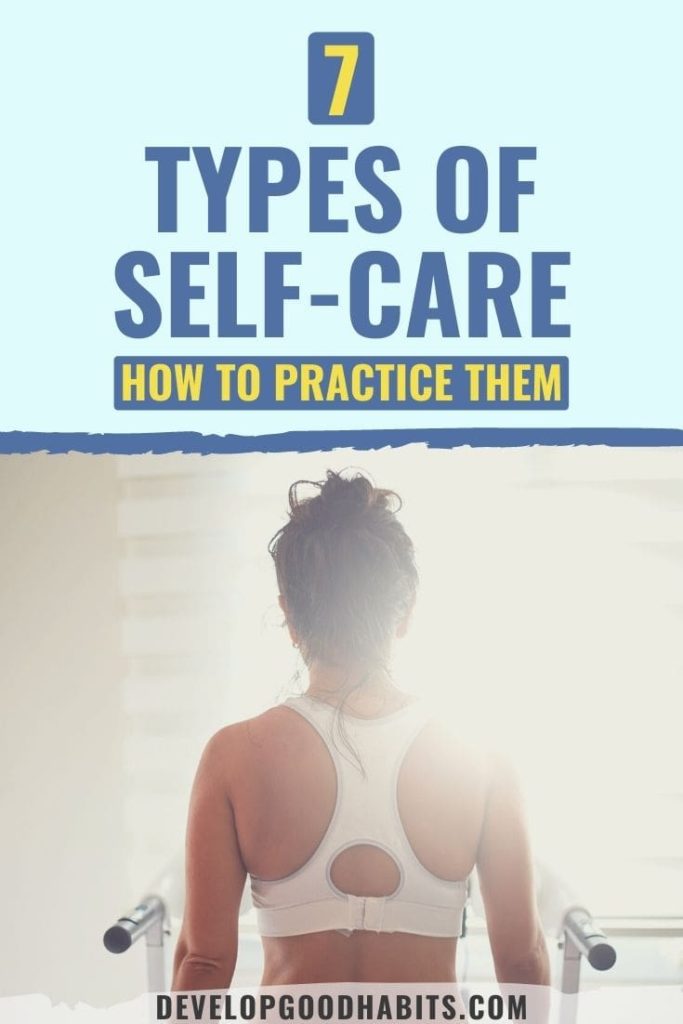In our fast-paced world, finding time to focus on personal well-being can sometimes seem impossible. There are too many things to do and not enough time.
However, self-care isn't a luxury—it's necessary to maintain balance and joy in our lives. Whether navigating the highs and lows of daily life or tackling stress head-on, discovering the right self-care practices for your needs can make all the difference.
From nurturing your body and mind to fostering soulful relaxation, self-care takes many forms, each as unique as the individual who embraces it.
So buckle up for a rejuvenating self-care journey as we explore seven transformative types of self-care and practical tips for seamlessly integrating self-care into your daily routine.
It's time to prioritize you!
So, let’s look at the seven types of self-care and how you can practice each type to improve your life.
But first, let’s quickly review precisely what self-care is.
What Is Self-Care?
There is a lot of history behind the concept of self-care, with external forces pushing this concept to the forefront of people’s minds. But, no matter why you’re practicing it, self-care serves the same purpose: to combat stress.
We all know that you cannot function at your best or take care of others without taking proper care of yourself. This doesn’t just apply to taking care of your physical self– it also requires your attention in life domains such as mental and emotional health.
In our epidemic of anxiety and depression, taking care of yourself is more important than ever.
At its heart, self-care is preventive maintenance.
If you had a fancy new car but never did any sort of preventive maintenance to keep it in tip-top shape, you would not have a nice car for too long. It would quickly become broken down.
The same is true in life. We need self care to stay our “best selves”.
Continuously practicing preventative maintenance regarding all areas of your health and taking an active approach to your own well-being will allow you to cope with potential illness and disability in a partnership manner with your healthcare provider and regain control over your life.
Let’s look at how you can do this.
7 Types of Self-Care and How to Practice Them
1. Physical Self Care
This type of self-care is the one that you’re most likely already familiar with. Physical self-care isn’t just about meeting your basic needs of food, water, sleep, and shelter. But it’s also not just about getting pedicures and massages every day. There are several dos and don’ts when it comes to physical self-care that you can practice to ensure your body is functioning at its best.
This means getting regular exercise, eating healthy foods, staying hydrated, practicing proper hand-washing and other hygiene habits, and giving your body the proper rest that it needs. When you prioritize physical self-care, you give your body the best opportunity to operate efficiently and effectively.
You become powered by natural energy when practicing physical self-care, which allows you to feel healthy and capable. Your immune system will be strengthened, which will aid your body in fighting off illnesses–meaning you will be sick less frequently and for shorter amounts of time than you would if you didn’t practice physical self-care.
But practicing physical self-care also means avoiding certain things, such as drugs, alcohol, excessive sugar, and anything else that can either harm your health or make you feel icky. This means being intentional about your bedtime, not pushing through your workday when you’re feeling sick, and going to regular doctor and dentist checkups to prevent health setbacks.
As long as you’re practicing physical self-care, you will be putting yourself in a good position to practice self-care in other domains of your life.
How to get started:
Simple Daily Physical Self-Care Ideas:
- Bubble bath
- Exercise
- Healthcare Appointments
- Healthy Diet
- Hydration
- Massage
- Meal Prepping
- Medication
- Naps
- Physical Activity
- Restorative Yoga
- Sleep
2. Emotional Self Care
Practicing emotional self-care will help you connect with your emotions, helping you process and handle them in a healthy manner.
When you practice emotional self-care, you can react to your feelings responsibly and constructively. Emotional self-care also involves practicing self-compassion and acceptance to help you maintain a healthy inner dialogue.
When you prioritize emotional self-care, you build the mental strength and resilience to overcome everyday challenges. Practicing emotional self-care requires acknowledging your unhealthy coping habits and learning how to replace them with healthier responses.
It’s about taking the time to compassionately approach your feelings so you can effectively handle emotional setbacks. You can talk to a close friend about your feelings or make time to do leisurely activities that can help you learn how to process your emotions.
How to get started with emotional self-care:
3. Social Self Care
Social self-care is essential to maintaining one's mental and emotional well-being.
Engaging in meaningful social interactions helps to reduce feelings of loneliness and isolation, fostering a sense of belonging and community.
By connecting with others, individuals can share experiences, lend support, and develop lasting relationships that provide a crucial support network during times of stress or hardship. This connectivity not only nurtures emotional health but also encourages the development of empathy and understanding, facilitating personal growth.
In addition to emotional benefits, social self-care positively impacts mental health by reducing stress and increasing happiness and life satisfaction.
Socializing with friends, family, or like-minded communities can release endorphins and other neurotransmitters, which contribute to improved mood and reduced anxiety. Furthermore, participating in social activities offers opportunities for relaxation, laughter, and fun—essential components of a balanced lifestyle.
Engaging socially encourages individuals to break away from daily routines, providing a refreshing escape that fosters mental rejuvenation.
Lastly, social self-care contributes to the enrichment of personal skills and development. Interacting with diverse groups of people exposes individuals to new perspectives and ideas, promoting cognitive flexibility and learning.
These interactions can spark creativity and innovation, which are valuable in personal endeavors and professional settings. Building and maintaining strong social connections can enhance communication skills, improve teamwork, and empower individuals to navigate various social situations more effectively.
Thus, prioritizing social self-care is integral to a holistic approach to health and wellness, ultimately leading to a more fulfilling and enriched life. It is a key to emotional well-being.
How to get started working on your social self care:
4. Mental/Intellectual Self-Care
Keeping your mind sharp and continuously challenging your cognition greatly influences your psychological well-being, which is where mental self-care comes in. Anything you can do to fuel your mind and make you think in new ways will help you stay inspired to be a lifelong learner.
Taking the time to learn something new can recharge your brain and re-energize your desire to learn. Being intentional about exposing yourself to new ideas can not only give you a better sense of mental acuity, it can also help you feel like you’ve accomplished something. This type of self-care is especially important during a quarantine where you’re at risk of feeling cognitively stagnant. Mental self-care will help assure that you continue growing, even when the world seems to have come to a halt.
How to get started:
5. Financial Self Care
Having a calm mind when your finances are a train wreck is nearly impossible.
Financial self-care involves reducing your financial stress by ridding yourself of bad spending habits and taking control of your money. Living with financial worries can impact all areas of your life, leading to stress, anxiety, and depression.
When people struggle financially, they tend to ruminate about it, which leads to worsening negativity that turns into a cycle of overall pessimism.
Practicing financial self-care can make it easier to deal with your finances by making sure you're tracking your income versus your spending. Whether you rely on a financial planning app, listen to a personal finance podcast, or manually record all of your spending, you can practice economic self-love to help reduce your overall stress.
No one will dispute the stress involved with having financial trouble, and practicing financial self-care may not always apply to your life if you're struggling with unemployment or having trouble making ends meet. And while self-care won’t change these situations for you, it can help you correct how you handle them.
Your relationship with money may look very different from your best friend’s, but you need to define how your finances shape your life and find a way to manage your money so your money doesn’t manage you.
How to get started:
6. Professional Self Care
Professional self-care is meant to reduce the stress surrounding your career. I struggle to find a healthy work-life balance, so professional self-care is important to me. It makes my working hours more efficient and helps me set boundaries that mark the end of work and the start of home.
When reading through how you can practice career self-care, you may think that some don’t apply to you or your profession.
For example, I can’t tell you the last time I didn’t take a “working” lunch–but these things are important to everyone. No one’s job is more important than their well-being because as soon as your well-being suffers, so will your performance at work. But if you have a sense of purpose at work and make sure your career goals are SMART, you should be able to clarify that line between your time and your work time.
How to get started:
7. Spiritual Self Care
No matter your spiritual beliefs, you can practice self-care through spirituality. Whether or not you consider yourself religious, caring for your soul is equally as important as caring for other aspects of yourself, and allowing all facets of your life to work together is a critical component of happiness.
You can have a spiritual experience even when wholly consumed in your favorite activity. So, like many other sectors of life, this can look different for everyone. You may find that you have strong mental breakthroughs when you’re transitioning between yoga poses, or you feel exceptionally connected to the earth when you follow your intuition, or you feel you’re living your purpose when you engage in meditation or spend time in nature.
Spiritual self-care involves anything you can do to tap into your spiritual side.
How to get started:
Final Thoughts on Types of Self-Care and How to Practice Them
Making yourself a priority will help you become the best version of yourself, and knowing what self-care works best for you is a start.
Whenever you start feeling burned out or a bit overwhelmed, take a minute to think about which type of self-care you might need to spend some time nurturing and get to it! With time, you’ll have a self-care routine that allows you to achieve both balance and clarity in your life, which will reduce stress and help you function at your best.
Finally, if you're planning to dedicate an entire day to self care, this post on self care day ideas can help.
See more ideas on self-care:
- 15 Self-Care Journal Ideas & Templates
- 11 Self-Care Blogs to Take Better Care of Yourself
- 275 Self-Care Ideas & Activities to Deal With Life

Connie Mathers is a professional editor and freelance writer. She holds a Bachelor's Degree in Marketing and a Master’s Degree in Social Work. When she is not writing, Connie is either spending time with her daughter and two dogs, running, or working at her full-time job as a social worker in Richmond, VA.



